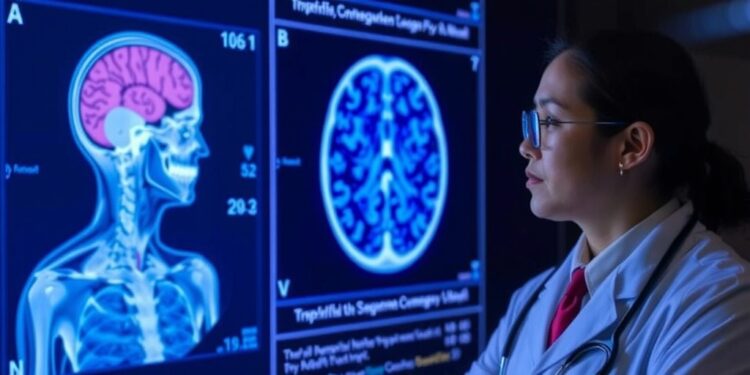
In the realm of oncology, the integration of artificial intelligence (AI) into treatment protocols marks a significant milestone, as evidenced by a groundbreaking study spearheaded by researchers at the renowned Moffitt Cancer Center in collaboration with the University of Michigan. The study demonstrates the potential of AI to refine clinical decision-making in the treatment of complex diseases such as non-small cell lung cancer and hepatocellular carcinoma, while also uncovering the intricate dynamics of human-AI collaboration in clinical settings.
The study, which is elegantly encapsulated in the article titled “Intricacies of human–AI interaction in dynamic decision-making for precision oncology,” published in the prestigious journal Nature Communications, focuses specifically on AI-assisted radiotherapy. Radiotherapy is among the most commonly deployed cancer treatments, utilizing high-energy radiation to target and obliterate malignant tumors. The researchers investigated a novel approach termed knowledge-based response-adaptive radiotherapy (KBR-ART). This innovative method leverages AI algorithms to enhance therapeutic outcomes by recommending real-time treatment adjustments influenced by the patient’s responses.
In their comprehensive evaluation, the researchers found compelling evidence that the application of AI in adjudicating treatment plans fosters greater consistency among physicians. By employing AI-driven models to propose alterations in radiation doses based on extensive patient data—including imaging and diagnostic results—doctors exhibited reduced variability in treatment decisions. Such standardization is particularly crucial in oncology, where inconsistencies can lead to disparate patient outcomes.
Nonetheless, the study also illuminated a key finding: while AI serves as a valuable ally, it does not necessarily supersede the clinical acumen of oncologists. In various instances, physicians chose to diverge from AI recommendations, citing their clinical judgment and individual patient considerations as paramount. This behavior underlines a crucial aspect of cancer care—each patient presents a unique profile defined by multifaceted factors that data-driven algorithms may not fully encapsulate.
During their investigation, clinical practitioners were tasked with making treatment choices for patients, first independently and subsequently with AI assistance. The AI framework utilized in this study proactively analyzed patient data to suggest adjustments in treatment protocols based on feedback concerning treatment efficacy. Although many oncologists embraced AI recommendations as beneficial, a notable subset preferred to rely on their professional intuition, underscoring the potent role of human expertise in the decision-making continuum.
Dr. Issam El Naqa, a leading figure in the study and chair of the Machine Learning Department at Moffitt, poignantly remarked on the fundamental interplay between AI analytics and human judgment in the oncology sphere. He emphasized that while AI provides powerful insights derived from intricate datasets, the quintessential human touch cannot be overlooked. Ultimately, cancer patients are not mere data points; they are individuals with unique histories requiring tailored therapeutic strategies.
The findings of this research extend beyond immediate clinical application. They underscore the necessity for building trust between clinicians and AI systems. The researchers demonstrated that physicians are more inclined to adhere to AI-generated recommendations when they possess confidence in its validity and reliability. Such trust is imperative for ensuring the constructive integration of AI within clinical practice. This relationship between clinicians and AI is not predicated on the displacement of one by the other, but instead hinges on the harmonious coexistence of human expertise and technological advancement.
Moreover, the implications of the study are profound. The authors advocate for the harmonious amalgamation of AI tools within everyday clinical workflows, aspiring to foster collaborative partnerships that enhance the personalization of treatment regimens offered to cancer patients. This study signifies a commendable leap forward; moving towards a healthcare paradigm wherein AI serves as a supportive backbone that fortifies clinical decisions rather than undermining the expertise and intuition of medical professionals.
In pursuit of future advancements, the research team plans to assess how AI can optimize decision-making across various medical fields. The need for interdisciplinary collaboration and knowledge transfer between fields is as paramount as ever. This endeavor may unveil new methodologies and strategies for harnessing AI’s capabilities in personalized medicine, thereby amplifying its advantages across a broader spectrum of healthcare concerns.
The study received substantial backing from the National Institutes of Health, particularly through grant R01-CA233487. This financial support underscores the critical need for comprehensive research in a landscape where technology and medicine converge, emphasizing that innovative approaches are essential to drive progress in cancer treatment.
As artificial intelligence continues to permeate various sectors of healthcare, the findings from this study serve as an invaluable framework for navigating the evolving landscape, highlighting the practicality and nuances of integrating AI into complex medical environments. The results signify a promising horizon for precision oncology and pave the way for a better understanding of how technological advancements can complement the efforts of healthcare professionals in addressing patients’ needs.
The research featured in this study stands at the cusp of multiple disciplines, from computer science to oncology, thereby allowing for a multifaceted exploration of its findings. Future exploration of the intricate interactions between human clinicians and AI systems will be pivotal in determining how best to harness these technologies for improved patient outcomes.
In conclusion, while this research points to a future where AI can significantly enhance cancer treatment pathways, it also serves as a reminder of the irreplaceable value of human intuition and expertise in navigating the complexities of patient care. As we continue to delve into the symbiotic relationship between machine learning and medicine, the journey towards optimizing clinical practices remains an exciting frontier.
Subject of Research: Cancer treatment decision-making using AI in precision oncology.
Article Title: Intricacies of human–AI interaction in dynamic decision-making for precision oncology.
News Publication Date: 30-Jan-2025.
Web References: Moffitt Cancer Center
References: DOI: 10.1038/s41467-024-55259-x
Image Credits: N/A
Keywords: Artificial intelligence, oncology, cancer treatment, radiotherapy, human-AI collaboration, precision medicine, decision-making, clinical research, machine learning.
Tags: AI in cancer treatmentAI-assisted radiotherapy techniquesAI-driven models for cancer careclinical decision-making in oncologyenhancing treatment effectiveness with AIhepatocellular carcinoma managementhuman-AI collaboration in oncologyimproving consistency in physician treatment plansknowledge-based response-adaptive radiotherapyMoffitt Cancer Center researchnon-small cell lung cancer treatmentprecision oncology advancements





